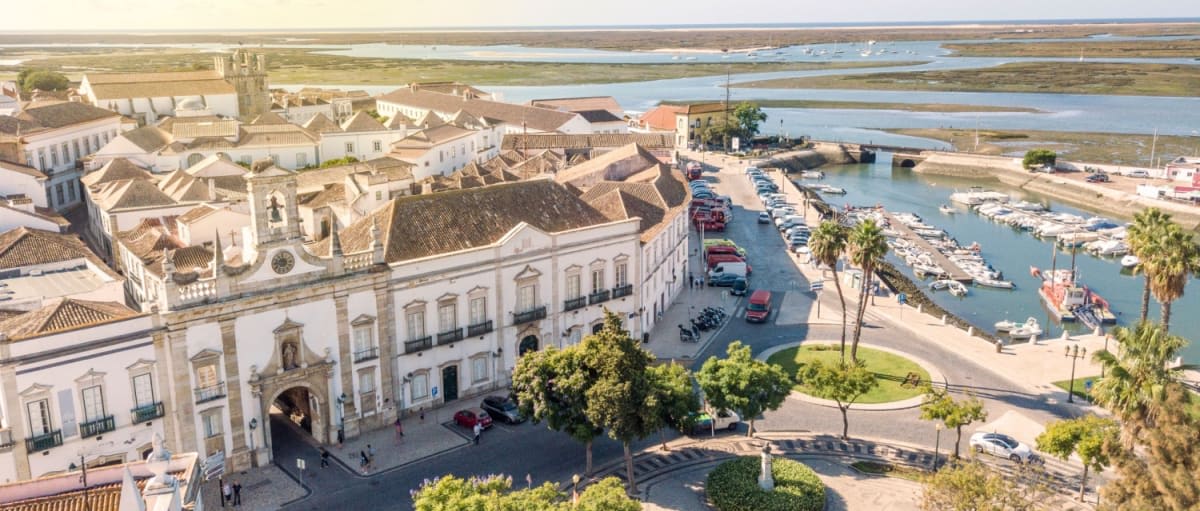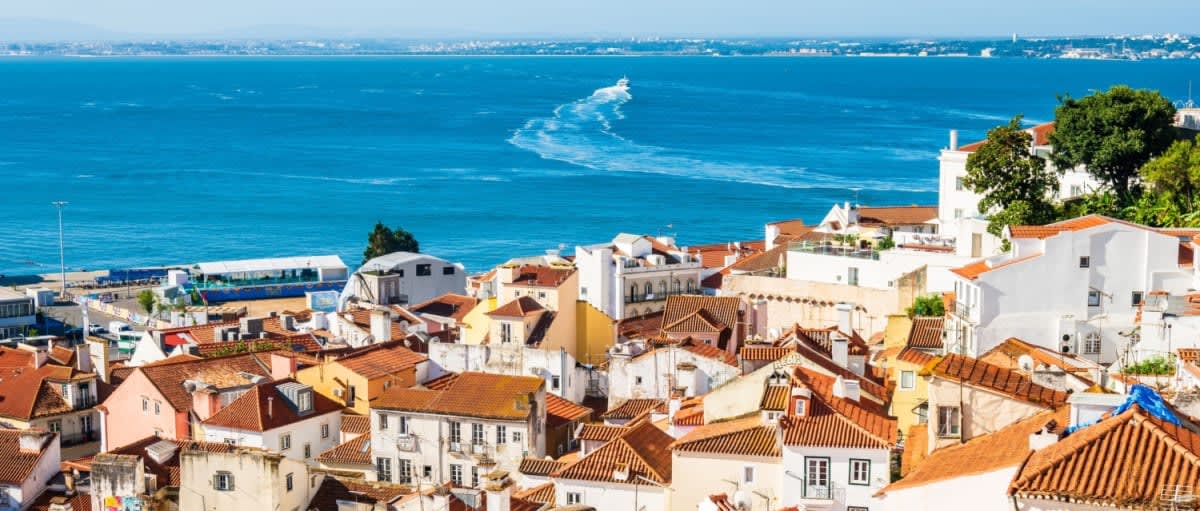Portugal continues to attract international buyers for its exceptional lifestyle, reliable infrastructure and good value for money. Whether you dream of a peaceful rural retreat, a home by the sea or an investment property in a lively city, Portugal combines affordability, safety and a warm welcome. In 2025, buyers from the UK, US, Europe and beyond are still actively drawn to the country’s vibrant mix of culture, sunshine and stability. It’s no wonder so many people are choosing to buy property in Portugal.
In this article, we explore the most important reasons to buy property in Portugal, including cost of living, natural beauty, connectivity, property investment opportunities and quality of life. We’ll also highlight practical considerations such as taxes, maintenance, and recent regulatory changes.
Contents

Cost of living and day-to-day expenses
Portugal remains one of western Europe’s most affordable countries, making it especially attractive to retirees and remote workers looking for excellent quality of life at a low cost. A 2024 index by Property Guides found Portugal ranked third for affordability among 13 popular destinations, with a basket of everyday groceries averaging 26% less than in the UK.
Even cities like Lisbon and Porto remain relatively affordable compared to other urban European centres. Eating out is inexpensive. A set lunch meal (prato do dia) often costs under €10. Public transport, particularly trains and buses, is cheap and well organised. Utilities and property taxes are also lower than in neighbouring countries. Petrol prices can be high, but if you live in a walkable town or near public transport hubs, car ownership is optional.
The affordability of Portugal’s everyday costs can make a big difference to your long-term budget, especially if you’re relocating full-time or planning an early retirement.
For a more detailed look at the purchase process, claim your free copy of our Portugal buying guide:
Download the Portugal Buying Guide
Climate and natural landscapes
Portugal’s climate is one of its biggest attractions. It offers more than 300 sunny days per year in many regions, especially the Algarve. The southern coast enjoys hot summers and mild winters, drawing beach lovers year-round. Further north, central Portugal and areas like the Douro Valley offer four distinctive seasons and lush countryside ideal for hiking, winemaking and nature lovers.
From the volcanic islands of the Azores to the mountainous region of Serra da Estrela, there’s no shortage of variety. Madeira, with its subtropical microclimate, is especially appealing for those looking to avoid extreme temperatures.
The Algarve’s long beaches and hidden coves, the wild Atlantic coast near Alentejo and the green valleys of northern Portugal present different scenery, all with appeal for second homeowners and investors. Many properties enjoy proximity to protected natural parks, forests or rivers. Portugal also actively promotes sustainability in housing and tourism, making it an appealing destination for environmentally minded buyers.
Travel and transport links
Portugal is well-served by three international airports: Lisbon, Porto and Faro. These offer frequent flights to the UK, Europe and destinations such as the US, Brazil and Canada. Lisbon and Porto airports operate year-round, while Faro sees increased traffic in spring and summer. Despite seasonal variations, travel into and out of Portugal is reliable and efficient throughout the year.
The country’s public transport network is modern and cost-effective. High-speed trains connect cities including Lisbon, Coimbra and Porto, while regional buses provide affordable access to smaller towns. Portugal’s motorways and secondary roads are well maintained, offering stress-free driving conditions compared to other southern European nations.
This accessibility makes Portugal a practical choice whether you’re commuting back and forth regularly or expecting guests. It also increases the value of properties located within easy reach of urban hubs and airports.
Friendly communities and cultural ties
Portugal is known for its hospitality and cultural openness. British and Portuguese diplomatic ties date back to the Treaty of Windsor in 1386 – one of the world’s oldest formal alliances. Today, Portugal offers a comfortable environment for international buyers, particularly from the UK, Europe and North America.
Many Portuguese people speak English, especially in tourist regions, and are often happy to help newcomers settle in. Neighbourhoods in the Algarve, Lisbon, Cascais and parts of Madeira boast thriving expat networks, which can be a great source of local knowledge and community.
Yet it’s also easy to immerse yourself in authentic Portuguese life. Inland towns and smaller rural villages receive fewer internationals and offer a more traditional experience. These areas tend to come with lower property prices and a slower pace of life.
Portuguese culture is based around family, food and enjoying life outdoors. Local markets, long lunches and seasonal festivals shape the lifestyle, in towns both large and small.
Lifestyle diversity across Portugal
Whether you prefer urban living or a quiet retreat, Portugal offers real variety in terms of lifestyle. Lisbon is a bustling capital with a fast-growing tech sector, international schools and diverse neighbourhoods. Porto, with its riverside charm, is increasingly popular with remote workers and European entrepreneurs. Both cities offer elegant apartments, contemporary new builds and historic homes.
In contrast, areas like Alentejo or inland Algarve suit those who value space, scenery and slower living. These regions are ideal if you’re looking for a farmhouse to renovate or want to grow your own food.
The Algarve remains one of Portugal’s most desirable areas for buyers seeking dependable sunshine, golf courses and proximity to beaches. Coastal towns such as Lagos, Tavira and Albufeira provide easy access to amenities and lively social scenes. For outdoor enthusiasts, Portugal is a paradise, with surfing, hiking, fishing and sailing all widely available.
If you’re focused on art, culture and dining, cities like Coimbra and Évora offer a rich mix of tradition and convenience – often at lower prices than larger hubs.
Property investment potential
Portugal’s property market remains solid and appealing in 2025, despite recent policy shifts concerning residency-linked investments. The popular golden visa route was amended in late 2023, removing residential real estate as an eligible category. However, property investment remains strong, with buyers still eligible under alternative routes such as supporting cultural projects or economic development.
Foreign interest remains high in key regions, especially the Algarve, Lisbon and Porto, with increasing attention on emerging hotspots like Setúbal, Comporta and the Silver Coast.
Portugal’s stable political environment, low crime rate and transparent legal system further add to its appeal for long-term investors. Buyers should always consult legal and financial professionals before purchasing, particularly if navigating company ownership, succession planning or foreign tax implications.
Property taxes in Portugal are lower than in much of Europe, and transaction times are usually predictable. If you are purchasing with cash or mortgage approval in place, most transactions can complete in three to four months.
Rental returns and lettings market
Portugal offers decent rental returns, particularly in city centres and coastal towns. As of mid-2024, the national rental yield average stood at 5.5%, with cities like Setúbal achieving 6.51% and Porto reaching 5.48%, according to data from Portugal’s National Statistics Institute (INE). Learn more about the returns you can make investing in Portuguese property.
The regulations around short-term rentals (Alojamento Local) have tightened in some urban zones such as Lisbon and Porto. However, in rural areas and tourist towns outside these zones, rental licensing is still accessible. Always check local council regulations before proceeding – rules differ by municipality.
Letting your property short-term can supplement ownership costs, though you’ll need to cover income tax, cleaning fees and license renewals. Long-term lets provide more stability and are usually subject to different tax advantages, including the Non-Habitual Resident tax regime, which continues to benefit new arrivals in specific cases.
Always speak to a qualified tax adviser about your exposure, particularly if you’re a non-resident landlord. Also, if you want to take some of the stress out of an overseas let, do look into ways to simplify managing your Portuguese property.
Possible challenges to consider
While there are many advantages to owning a home in Portugal, it’s wise to be aware of possible challenges. Summer tourism in hot spots like the Algarve can be intense – ideal for those renting out, but less appealing if you’re seeking peace and quiet. Winter in some areas, especially inland, can be damp and cool, and some villages may feel isolated without a car.
Climate change is another factor to consider. Parts of southern Portugal experienced record temperatures above 40°C in recent years. That said, regions like the north, central interior and islands such as Madeira remain cooler year-round. Urban heat management is improving, with many new developments incorporating energy-efficient design.
Mortgage eligibility for foreign buyers can be restrictive without a strong financial profile. It’s essential to have documentation in order, including translated tax returns and bank statements, to meet lender criteria. You’ll usually need a deposit of at least 20–30% for non-resident loans.
Lastly, while Portugal’s buying process is legally secure, it’s a different system to that of the UK or US. Use an independent, bilingual lawyer and avoid skipping due diligence. If you’re investing seriously, speak to a financial adviser to map how this fits within your wider portfolio.
Ready to begin?
Portugal continues to deliver in 2025 – whether you’re seeking sun, value or long-term growth. From beach homes in the Algarve to renovated townhouses in Lisbon, buyers have plenty of choice. If you’re ready to explore your options, book a free consultation with Your Overseas Home today. We connect you with trusted experts, from estate agents and lawyers to currency specialists, so you can buy with confidence and clarity.
Now that you know the key reasons to buy, make sure you’re fully prepared for the next step. Read our expert guide on how to buy property in Portugal to learn the full process from start to finish. Still deciding on a location? Our region-by-region breakdown of where to buy property in Portugal will help you compare options based on lifestyle, investment appeal and affordability.
Frequently asked questions
Portugal offers a rare combination of lifestyle and value: low cost of living, a warm climate, modern infrastructure, and a secure legal system. Whether you’re retiring, relocating or investing, Portugal provides stability, sunshine and long-term growth potential.
Yes. Despite recent policy changes to residency-linked visas, Portugal continues to attract global buyers. Popular areas like Lisbon, the Algarve and Porto remain in demand, and yields in cities such as Setúbal and Porto exceed 5%. Properties in emerging regions also offer capital appreciation opportunities.
Portugal’s property market is secure, but there are regional challenges. Popular tourist areas may be crowded in summer, and mortgage access can be limited for foreign buyers. Legal and tax advice is essential to avoid pitfalls and ensure a smooth purchase.









